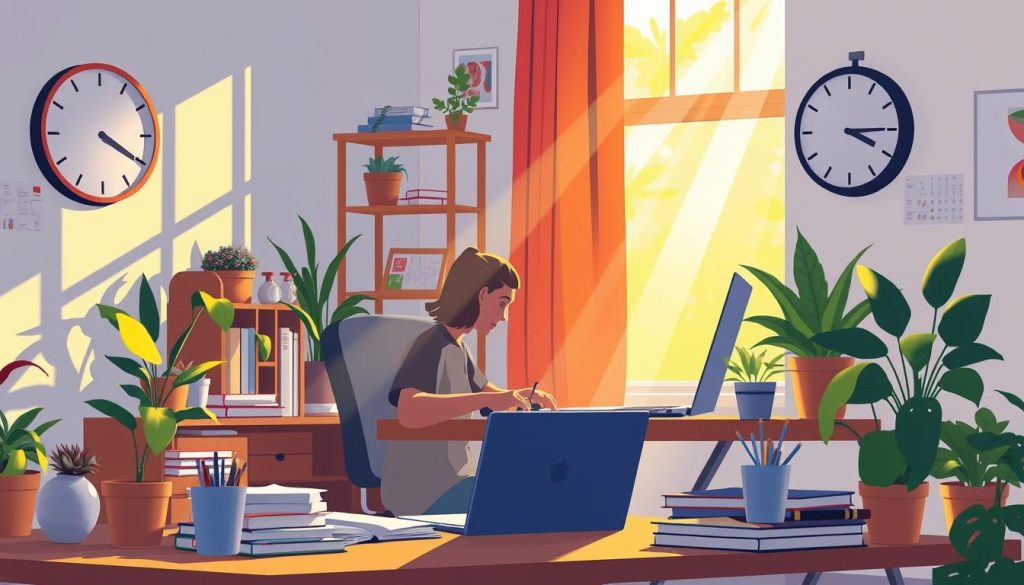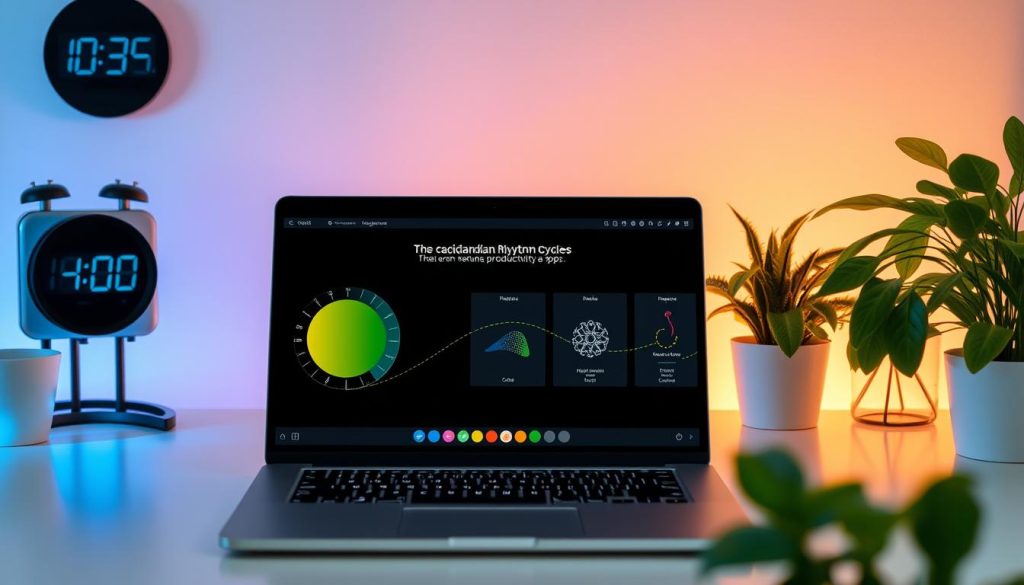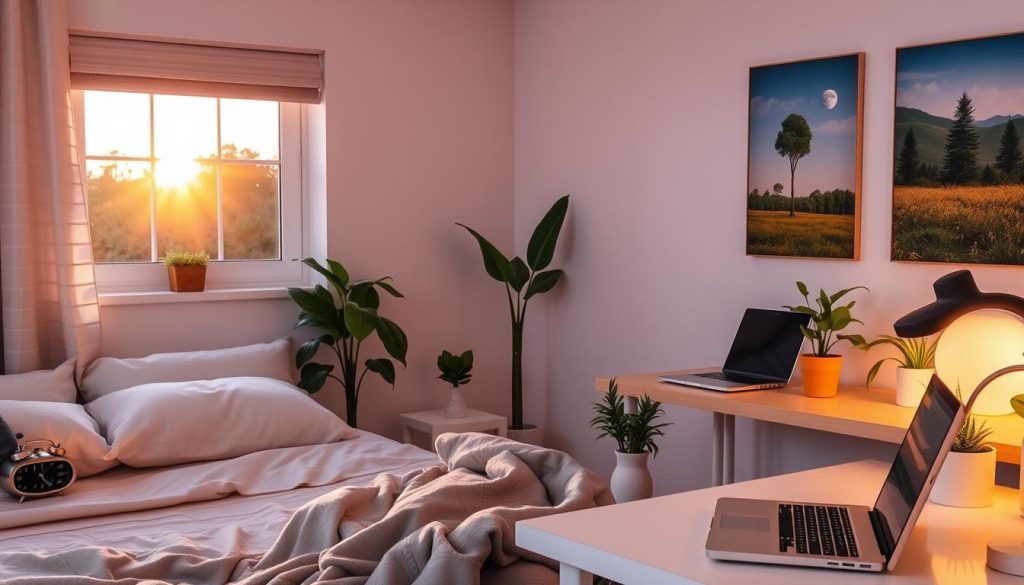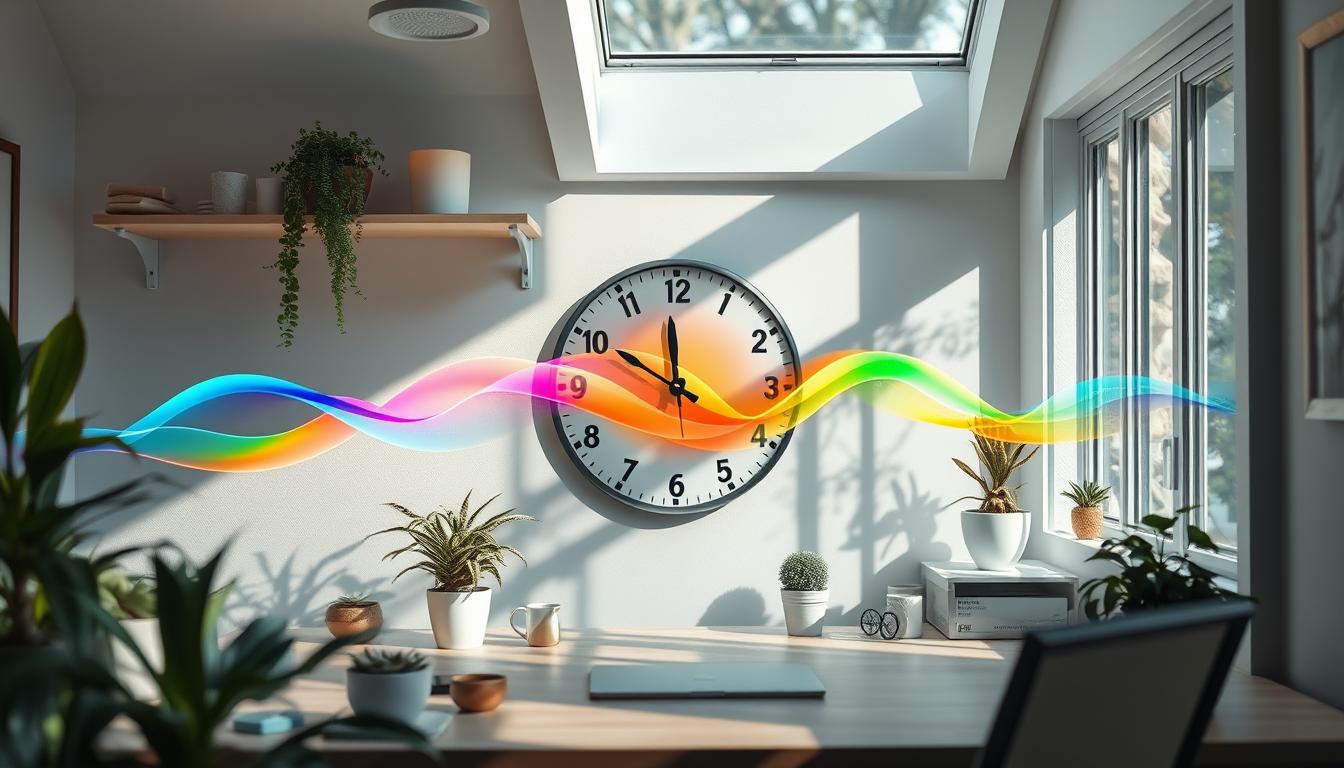Have you ever noticed some days you feel more productive than others? This might be because of your circadian rhythm, a natural body clock. It affects your energy and focus. By understanding it, you can boost your productivity and feel better.
Studies from the National Institutes of Health (NIH) and the Sleep Foundation show a link. Working when you’re most alert can increase your energy and focus. Let’s dive into how your body clock and productivity are connected, and how to make the most of your day.
Understanding Circadian Rhythms
Learning about circadian rhythms is key to a better life. These rhythms are 24-hour cycles that affect my sleep, eating, and hormone levels. The National Sleep Foundation and Mayo Clinic say they impact my health and happiness.
What Are Circadian Rhythms?
Circadian rhythms are daily cycles that control my body’s functions. They are part of circadian biology, which looks at how light affects my internal clock. My body adjusts to the environment, influencing my energy and alertness.
The Science Behind My Body Clock
My body’s clock is controlled by external cues, especially light. When it’s dark, my body makes more melatonin, telling me to sleep. This balance of light and hormones helps me stay awake and asleep at the right times.
Harvard Medical School research shows that ignoring these cues can mess with my cycles. By following my natural rhythms, I keep my body in top shape.
How Circadian Rhythms Affect Productivity
Knowing how my circadian rhythms affect my daily productivity is key for good time management. By finding out when I’m most energetic, I can plan my day better. Tim Ferriss and others say doing hard tasks when I’m most alert boosts my productivity.
Identifying My Peak Performance Times
My best work hours are when I’m most alert and focused. To find these, I track my energy levels all day. I sort my tasks by when I’m most efficient.
| Time of Day | Energy Level | Recommended Activities |
|---|---|---|
| 6 AM – 9 AM | High | Creative tasks, brainstorming |
| 9 AM – 12 PM | Moderate | Focused work, meetings |
| 12 PM – 3 PM | Low | Routine tasks, administrative work |
| 3 PM – 6 PM | Moderate to High | Collaborative projects, problem-solving |
The Impact of Sleep on My Daily Rhythm
My sleep quality greatly impacts my productivity. Regular sleep helps keep my energy and focus steady. Poor sleep hurts my brain and messes with my work cycle.
Studies from the American Academy of Sleep Medicine show the importance of good sleep. To improve, I stick to a sleep schedule, relax before bed, and avoid screens.

Aligning Work Schedules with Circadian Rhythm
Creating a work schedule that fits my natural rhythm has boosted my productivity. I track my energy levels to plan my day better. Using journals or apps helps me know when I’m most focused.
Creating a Personalized Work Schedule
I plan my day based on when I’m most alert. For instance, I do my hardest tasks in the morning. Here are some tips to make your schedule better:
- Keep a log to find when you’re most productive.
- Sort your tasks by when you have the most energy.
- Take breaks to rest and recharge.
Using Technology to Sync My Life
Technology helps me stay in sync with my natural rhythm. There are many tools to track your habits. Here are some I find helpful:
- Apps that help manage your work and rest times.
- Wearables that track your sleep and give insights.
- Tools that adjust screen brightness based on the time.

Practical Tips to Enhance Circadian Rhythm and Productivity
Improving my sleep and diet has boosted my productivity and health. By using certain strategies, I’ve aligned my habits with my body’s natural rhythms. Here are some sleep and diet tips that have helped me.
Strategies for Better Sleep Hygiene
Creating a calming bedtime routine has greatly improved my sleep. Some practices I find helpful include:
- Establishing a consistent sleep schedule to help regulate my internal clock.
- Engaging in relaxing activities before bed, such as reading or meditation.
- Avoiding screens an hour before sleep to limit exposure to blue light.
- Keeping my sleep environment cool, dark, and quiet to promote restful sleep.
Studies from the Sleep Research Society show that these habits help me fall asleep faster and sleep longer. These changes are key for better sleep and productivity.
Optimal Diet Choices for Energy Management
My diet is crucial for keeping my energy up all day. By choosing the right foods, I’ve seen a big boost in my productivity. Here are some energy-boosting foods I eat:
- Complex carbohydrates like whole grains that provide sustained energy.
- Lean proteins, such as chicken and beans, which help with muscle repair and growth.
- Healthy fats found in nuts and avocados that contribute to brain function.
- Fruits and vegetables rich in vitamins and antioxidants to boost overall health.
Knowing how nutrition affects my circadian rhythms helps me make better food choices. The Academy of Nutrition and Dietetics says a balanced diet is key for energy and productivity.

| Food Type | Benefits | Examples |
|---|---|---|
| Complex Carbohydrates | Provides sustained energy | Oatmeal, brown rice |
| Lean Proteins | Supports muscle repair | Chicken, tofu |
| Healthy Fats | Enhances brain function | Nuts, olive oil |
| Fruits and Vegetables | Boosts overall health | Spinach, berries |
The Role of Light in Regulating Circadian Rhythms
Light exposure greatly affects my body’s circadian rhythm. Knowing the difference between natural and artificial light helps me manage my sleep and energy. Blue light from screens is a special challenge I face every day.
Natural vs. Artificial Light: What I Should Know
Natural light, especially from the sun, is key to my circadian rhythms. Sunlight during the day boosts hormones for sleep and wakefulness. But artificial light, especially blue light from screens, can mess with this balance and harm my sleep.
- Natural light boosts serotonin production during the day, aiding mood and energy levels.
- Artificial light exposure in the evening can interfere with melatonin production, making it difficult to fall asleep.
- Blue light effects from screens can trick my brain into thinking it’s still daytime, delaying my natural sleep-wake cycle.
To balance light exposure effectively, I follow these tips:
- Spend at least 30 minutes outdoors each morning to soak up natural light.
- Limit screen time in the evening, especially before bed.
- Incorporate blue light filters on digital devices to minimize disruptive effects.
- Create a dim, cozy atmosphere in the evening with soft, warm lighting.
By understanding light’s role and using these strategies, I can improve my circadian rhythm. This leads to better productivity and overall well-being.
Challenges to Maintaining a Healthy Circadian Rhythm
Keeping a healthy circadian rhythm is tough. Things like shift work and traveling often disrupt it. These issues can hurt my health, so finding ways to manage them is key.
Shift work messes with my sleep schedule. It’s hard to keep my body’s clock in sync with daylight. Traveling across time zones adds to the problem, causing jet lag that messes with my rhythm.
My lifestyle choices also affect my sleep. Watching screens late and eating heavy meals before bed can make it hard to sleep. Knowing this helps me understand what my body needs for good sleep.
To fight these challenges, I use tips from health studies. A routine helps keep my rhythm in check. I stick to regular sleep times, create a calm sleep space, and avoid screens before bed. Getting advice from doctors can also help me find the right balance.
| Challenge | Description | Tips for Mitigation |
|---|---|---|
| Shift Work | Inconsistent sleep schedules lead to circadian rhythm disruption. | Maintain a consistent sleep routine when off shift; use blackout curtains. |
| Travel | Crossing time zones disrupts my internal clock. | Adjust sleep schedule gradually before travel; stay hydrated. |
| Lifestyle Choices | Irregular screen time and late meals affect sleep quality. | Limit screen time an hour before bed; opt for light snacks in the evening. |
Conclusion
Reflecting on this article, I see how important it is to understand my circadian rhythms. By knowing when I’m most productive and improving my sleep, I can boost my health and work. This lets me plan my day to match my body’s natural rhythm.
This isn’t just about being more productive. It’s about making choices that help my body and mind. By focusing on sleep, food, and light, I improve my health. This is more than just work; it’s about taking care of myself.
My lifestyle and body clock working together is a big change. By following this path, I’m ready to find more energy, creativity, and health. I’m excited to see how my life will change as I keep in tune with my body’s natural rhythm.

